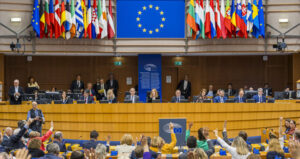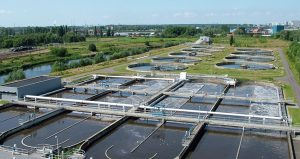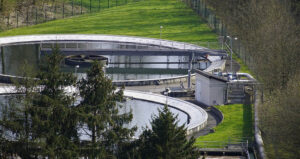European Parliament weakens revision of the Urban Waste Water Directive

-
 Jeroen Bezem
Jeroen Bezem
Share article:
The European Parliament has adopted the proposal to revise the European Urban Wastewater Treatment Directive (UWWTD) by a large majority. But before that happened, the MEPs weakened the much-talked-about Extended Producer Responsibility. EurEau, the European trade association of water managers and drinking water companies, calls it a ‘missed opportunity’.
On October 5, the European Parliament in Strasbourg voted on a proposal that the European Commission will submit in October 2022. This involved a revision of the 1991 Urban Waste Water Treatment Directive to bring it into line with the EU’s policy objectives on climate action, the circular economy and pollution reduction.
Fourth stage
The main elements of the revision proposed by the Commission were a requirement for additional treatment of drug residues and other micro-pollutants and the role that drug and cosmetics manufacturers should play in financing that fourth stage. The European Commission introduced the principle of Extended Producer Responsibility in the treatment of urban waste water. Since 92 per cent of toxic micro pollutants in EU wastewater come from pharmaceuticals and cosmetics, the Commission wanted to oblige manufacturers to pay the costs of removing those pollutants. The expectation in Brussels was that this will lead to more research and innovation in the field of toxic-free products and to fairer financing of wastewater treatment.
National financing
However, the European Parliament significantly watered down the EPR in the ultimately adopted revision proposal (420 votes in favor, 62 against and 84 abstentions). A text adopted by parliamentarians adds that producer responsibility must be paid with national financing, due to the high social value of the sectors covered by extended producer responsibility. This national financing should not exceed 20 percent and should not undermine the ‘polluter pays’ principle.
Essential products
Moreover, MEPs added that due to national differences, Member States should be given sufficient flexibility to indicate which products are classified as essential products, for example medicines with a major impact on quality of life, hygiene products or sun protection products. The list of product groups should be adapted in the future, if necessary, in view of scientific and technological developments, the evolution of the range of products placed on the market and new data resulting from controls.
PFAS
Another adopted amendment states that the European Commission may now assess the need to extend the scope of extended producer responsibility, in particular to marketed products containing microplastics and per- and polyfluoroalkyl substances (PFAS), taking into account any restrictions on PFAS.
Missed opportunity
The European providers of drinking water and wastewater services, united in the international trade organization EurEau, say they are concerned about the affordability of European water treatment for consumers due to the adopted amendments. “The European Parliament has really missed the opportunity to support the original ambitious EPR and the polluter pays principle,” said Pär Dalhielm, President of EurEau.
Council votes for full EPR implementation
The European Council voted 16 October on EP amendments on Extended Producer Responsibility. The Council calls for the full implementation of an EPR scheme to cover the costs of quaternary treatment, and setting a deadline. They want 3 years after the entry into force of the Directive to have all measures in place that will allow to implement EPR, as a means to realise the Polluter Pays Principle in the water sector.
Higher water rates
According to Dalhielm the EPR ambition and the implementation of the polluter pays principle have been weakened by the inclusion of a co-financing model for the costs of an additional treatment stage for the removal of micro-pollutants. This will lead to an increase in water rates for water consumers in all of Europe. Water services, including drinking and wastewater, are essential and crucial services, as well as a human right, and their affordability for all must be ensured.”
Urgent investments
The vote in Strasbourg was crucial, according to EurEau, because the urgent investments needed in the sector to maintain good water quality and quantity for all require a responsible financing system and effective control at source. Dalhielm: “On the other hand, we welcome the recognition by Members of the European Parliament of the challenges and realities of the wastewater sector with regard to energy neutrality,” the international trade association said. EurEau says it will continue to work with the EU institutions and other stakeholders to protect human health and the environment
Big step
Finnish MEP Nils Torvalds, who wrote the parliament’s response to the Commission’s proposal, was considerably more positive than EurEau: “This is a big step towards cleaner water in Europe! Due to climate change, we are facing major water challenges and we must ensure that we manage our water resources well. With eutrophication, micro-pollution and droughts, every drop counts.” The European Parliament is now ready to start discussions with national governments on the final form of the law, now the Council of Ministers has also adopted a position.


















